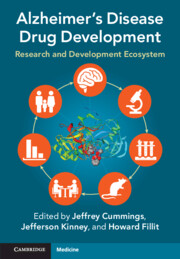Book contents
- Alzheimer’s Disease Drug Development
- Alzheimer’s Disease Drug Development
- Copyright page
- Dedication
- Contents
- Contributors
- Foreword
- Acknowledgments
- Section 1 Advancing Alzheimer’s Disease Therapies in a Collaborative Science Ecosystem
- Section 2 Non-clinical Assessment of Alzheimer’s Disease Candidate Drugs
- Section 3 Alzheimer’s Disease Clinical Trials
- Section 4 Imaging and Biomarker Development in Alzheimer’s Disease Drug Discovery
- Section 5 Academic Drug-Development Programs
- Section 6 Public–Private Partnerships in Alzheimer’s Disease Drug Development
- Section 7 Funding and Financing Alzheimer’s Disease Drug Development
- 41 Financing Alzheimer’s Disease Drug Development
- 42 Valley of Death and the Role of Venture Philanthropy in Alzheimer’s Disease Drug Development
- 43 Alzheimer’s Association Funding and Policy for Alzheimer’s Disease Drug Development
- 44 The Role of Philanthropy in Alzheimer’s Disease Therapeutic Development
- 45 National Institute on Aging’s Alzheimer’s Disease Translational Research Program: Diversifying the Drug-Development Pipeline for the Treatment and Prevention of Alzheimer’s Disease and Related Dementias
- 46 Alzheimer ’s Disease Drug Discovery and the Evolution of Start-Up Biotechnology Companies: Cognition Therapeutics, Inc. as a Case Study
- 47 Introduction to Venture Capital in Alzheimer’s Disease Drug Development
- 48 Federal Small Business Support for Small Businesses Pursuing Alzheimer’s Disease Drug Development
- Index
- References
47 - Introduction to Venture Capital in Alzheimer’s Disease Drug Development
from Section 7 - Funding and Financing Alzheimer’s Disease Drug Development
Published online by Cambridge University Press: 03 March 2022
- Alzheimer’s Disease Drug Development
- Alzheimer’s Disease Drug Development
- Copyright page
- Dedication
- Contents
- Contributors
- Foreword
- Acknowledgments
- Section 1 Advancing Alzheimer’s Disease Therapies in a Collaborative Science Ecosystem
- Section 2 Non-clinical Assessment of Alzheimer’s Disease Candidate Drugs
- Section 3 Alzheimer’s Disease Clinical Trials
- Section 4 Imaging and Biomarker Development in Alzheimer’s Disease Drug Discovery
- Section 5 Academic Drug-Development Programs
- Section 6 Public–Private Partnerships in Alzheimer’s Disease Drug Development
- Section 7 Funding and Financing Alzheimer’s Disease Drug Development
- 41 Financing Alzheimer’s Disease Drug Development
- 42 Valley of Death and the Role of Venture Philanthropy in Alzheimer’s Disease Drug Development
- 43 Alzheimer’s Association Funding and Policy for Alzheimer’s Disease Drug Development
- 44 The Role of Philanthropy in Alzheimer’s Disease Therapeutic Development
- 45 National Institute on Aging’s Alzheimer’s Disease Translational Research Program: Diversifying the Drug-Development Pipeline for the Treatment and Prevention of Alzheimer’s Disease and Related Dementias
- 46 Alzheimer ’s Disease Drug Discovery and the Evolution of Start-Up Biotechnology Companies: Cognition Therapeutics, Inc. as a Case Study
- 47 Introduction to Venture Capital in Alzheimer’s Disease Drug Development
- 48 Federal Small Business Support for Small Businesses Pursuing Alzheimer’s Disease Drug Development
- Index
- References
Summary
Venture capital can play a role in bridging the gap between laboratory-based research and therapies developed by pharmaceutical companies for Alzheimer’s disease (AD). The Dementia Discovery Fund (DDF), was formed to provide funding and expertise to support companies developing novel treatments for dementia. Combining a focus on dementia with the rigour of for-profit venture capital investing greatly improves the odds of developing an effective therapeutic. Investment decisions are based on credible, proven science with the potential to deliver a drug, supported by excellent management teams. The DDF supports companies both financially and strategically drawing on the vast experience of its team of venture investors and scientific experts. Building syndicates with other investors de-risks individual investments, also providing the company with access to more capital and range of expertise. With a recent increase in the amount of available risk capital, coupled with a better understanding of the pathophysiology of AD and the use of precision medicine approaches, venture capital can have a greater impact on the discovery and development of a life-changing drug for patients with AD.
Keywords
- Type
- Chapter
- Information
- Alzheimer's Disease Drug DevelopmentResearch and Development Ecosystem, pp. 524 - 532Publisher: Cambridge University PressPrint publication year: 2022

